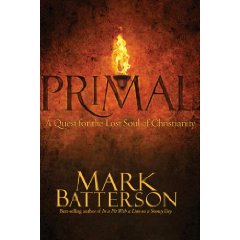For you regular here at the CrossEyedLife, you know I’m a reader. I don’t just believe in it, I enjoy it (that is, once I got out of school. No one likes reading when they are forced to).
The picture that accompanies this blog is the right hand corner of my desk that several of my ‘loving’ brothers and sisters have offered to file/clean for me. But, I share with each of them that the corner stack, mound, pile, library (proper usage check) is actually not static, but in frequent turnover.
These are the ‘next read’ books and when one is finished another is added. I love reading, learning and growing, and several times I have quoted, or even taught from significant reads. Never, though, have I reviewed a book here at CEL, so, today we make history.
As always, my first recommendation to you is to read, re-read and re-read again the Bible, but I also want to make this recommendation: Primal by Mark Batterson should be a primary read for you in 2010.

I received an advanced copy of the book for the purpose of this review a couple weeks ago and I swallowed it up. I’d let you borrow my copy, but it would be hard to read through the excessive highlighting.
As Batterson laid out the plan for the book in the early chapters, I have to admit I was a little disappointed. Primal as a title lead me to think this work would be about essential, rugged, brutal faith issues.
However, Primal is a book focusing on the Great Commandment (it’s the first footnote) from Mark 12:30:
Mark 12:30 (NIV) ‘Love the Lord your God with all your heart and with all your soul and with all your mind and with all your strength.’ – Jesus
I know I should be excited about that… it’s the Great Commandment! All I could think is, “What’s essential, rugged, brutal or primal about love verses?”
Seriously, I own half a dozen books with this teaching as the fulcrum. I’ve heard a hundred sermons on these verses. I probably do a series based on these four elements every other year. I felt like the idea is played out.
(Pretty stupid idea when you remember that all Scripture is living and active, Hebrews 4:12, but I though it anyway)
While Primal does stick to this well-known model (loving God with all our heart, soul, mind and strength), that’s where the similarities to other over-done motifs end. That’s where it gets primal.
Batterson strips down the intention of Jesus’ words to their most simplistic interpretation and brutally asks the question again and again, ‘How are you doing?’
When I answered honestly… not so well.
The breakdown goes something like this (don’t worry, no need for a spoiler alert, it’s just an outline):
- Loving God with all you heart means we need to cultivate a spirit of compassion and respond to the unmet needs of the world around us. Sacrifice, awareness and giving are the major themes.
- Loving God with all your soul means finding a sense of wonder about God and God through His creation. Scriptural meditation, living Scripture and paying attention to your world are the major themes.
- Loving God with all your mind means renewing (or beginning) a holy curiosity in your life about God stuff, but noting that all things in creation are God stuff. Reading, learning, growing and stretching were the major themes. (This was my favorite section, probably because it’s my healthiest area, so, it’s less depressing to think about what I need to work on. For those who choose to read it, embrace the concept of the ‘watchtower’. Sorry, insider stuff here; only for us Prim-ates)
- Loving God with all your strength means applying what we know and turning faith back into a verb. Sweat equity, dependency and risk were the major themes.
Much has been said about the Great Commandment, but Batterson really conveys a life transformed, a church renewed and a potential world reached and changed if followers of Christ would get primal in their understanding.
With regard to the heart of Christianity, Batterson argues that the primal call of God is to be compassionate, sacrificial and giving. And, yes, this includes money.
One of the radical and mind-numbing thoughts related to cultivating this Christ-like heart is a thorough makeover of how believers should budget. In the church we are taught the principle of the tithe where we acquire more and more and give God a small fraction.
That’s so Old Testament. It’s really just giving off the edges.
Batterson, however, suggests we move from quantifying how much we give and instead decide how much we will keep. In other words, don’t decide how much you’ll give to God or to things that God would lead you in, but decide how much you need to live on and let the rest be an offering out of your life.
He calls it an income ceiling.
In this model, a raise at work doesn’t changed your standard of living, thats already been set. A raise then means you have more to impact a world of need because you’ve already decided to cap your income.
In the book there is a great example of this lifestyle. A successful businessman named Stanley Tam, age 93, who hasn’t taken a raise in three decades and he tithes substantially more than he makes. He has set an income ceiling, and makes sure the rest goes where it does some good.
In his own words, “A man can only eat one meal at a time, wear only one suit of clothes at a time, drive only one car at a time. All this I have. Isn’t that enough?” (from Primal, pg 35).
Now that’s primal.
There’s something radically transforming about that kind of primal living. It affects the one living it and those living around them.
This past weekend, between a couple of our services at church a man whom I consider a friend and have great respect for, pulled me aside.
Through a tearful confession and words like “I was wrong”, “I’m growing a lot through this”, and “I just want to be more useable to God” I was blown away.
The issue he spoke of was really a non-issue to me, and I tried to tell him that.
He tolerated no softening on my part. He was committed to holding fast to Scripture, relationships and spiritual growth and he was not looking for an easy way out.
I’ve been haunted by that all week. It was powerful. It was impacting. It was primal.
This kind of response is what Batterson is calling readers toward as they embrace the Great Commandment. A no-holds barred, in your face, unrelenting love of God with all our heart, soul mind and strength.
No free passes.
Do I suggest the book? Absolutely. In fact, I just ordered two more books previously written by Batterson: In A Pit With A Lion On A Snowy Day and Wild Goose Chase.
I bet we talk about them soon.
